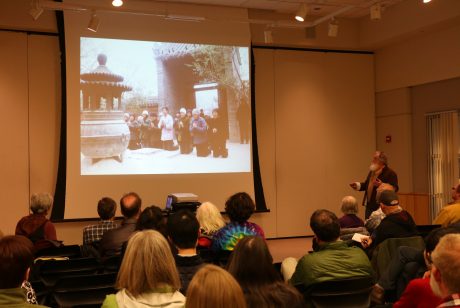Valuing diversity on the Palouse, the Confucius Institute at the University of Idaho aims to educate the public on Chinese culture.
Held once a semester in the Whitewater Room of the Idaho Commons, the seminar series China on the Palouse allows audience members to learn about different topics related to Chinese culture.
China scholar Bill Porter gave a slide presentation Monday on the spiritual traditions of Daoism, Confucianism and Buddhism. He provided historical background on each popular tradition and explained their connection to solitude.
Spending time alone, usually in the mountains, has been an essential part of all three philosophies for thousands of years, Porter said.
“Daoists practice harmony of the body, Confucists practice harmony of society and Buddhists practice harmony of the mind,” Porter said. “Chinese tradition relies on the hermits of these cultures, and I refer to them as being able to earn their Ph.D. in spirituality.”
Porter shared his experiences of living in a Taiwanese farming town for 14 years and two different bunk monasteries for four years, expanding mostly on his study of hermits.
Hermits are people who live by themselves in the mountains for an average of three to five years, practicing mediation and earning their respect from villagers.

Leslie Kiebert | Argonaut
Bill Porter presents on The Three Pillars of Chinese Thought: And the Search for Solitude Monday in the Whitewater Room of the Idaho Commons.
“In the Chinese culture, you’re not respected until you’ve spent time alone,” Porter said.
They (hermits) network among each other on sacred mountain sides, where older hermits help teach the younger generation ritual, plant identification and knowledge, survival skills and how to make small amounts of money by selling to herb collectors, Porter said.
The search for solitude has been at the core of Chinese civilization and remains a prominent part of their culture today.
Although hermits don’t have governmental permission to overtake areas of mountain sides as their peaceful homes, the sacred mountains they occupy only account for one percent of all mountains in China, Porter said.
“It is impossible to find a famous Daoist, Confucist or Buddhist who has not been a hermit,” Porter said. “They are very good at mediation practices and are well respected once they integrate back into society and become educators.”
Administrative Coordinator for the Confucius Institute, Mikayla Frey, said that China on the Palouse is a great way to educate Idahoans on Chinese culture.
A lot of people just think of China as a large, populated entity and fail to recognize the actual culture, Frey said.
“The Chinese culture has had little to almost no outside influence, making it easier to preserve its traditions,” Frey said. “In a very real way, you can tell the history and culture of China in a single character of the language. The Chinese language is beautiful because it has grown from itself, whereas the English language has Latin roots and other ancestry.”
Frey said the lectures can bring in topics that are too specific or too broad to be discussed in classes, so the seminar series serves as an opportunity for anyone and everyone to broaden their education.
Finding speakers is a collaborative process between the university and the Confucius Institute. Often professors suggest bringing in authors of noteworthy books they have read or the creators of interesting online lectures.
Sometimes the guest speaker is someone local who wants to share their experiences of visiting and researching different parts of China.
Porter is the author of 20 books written in English and nine books written in Chinese. Although he never became a hermit himself, he wrote of his experiences with immersing into a much different culture than America.
He left the audience to ponder that time alone is indeed a way to develop an individual voice, and this time alone is exceptionally respected in other parts of the world.
“There is an old saying that the ‘little hermit lives in the mountains and the great hermit lives in town,’” Porter said. “In order to maintain harmony, you have to be a little hermit in order to become a great hermit.”
Allison Spain can be reached at [email protected]

Greg
What's a "bunk monastery"?
Ernest Lee
This piece is well written. It portrays Chinese culture from the perspective of solitude seeking, which is essential in Chinese philosophies but often inundated by coverages of other surface matters. Allison must have done her research well.